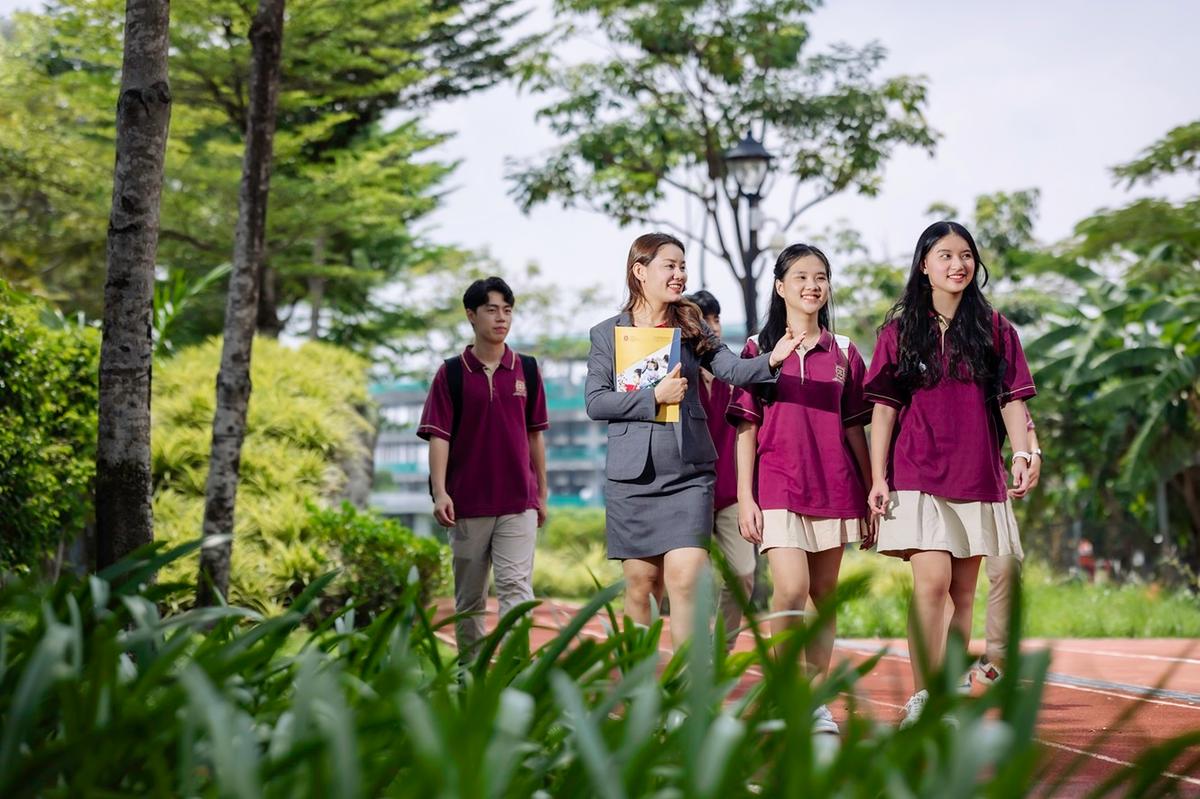- Home
- Admissions process
Admission
process
process
Admission to Vietnam Australia International School (VAS) for students in Kindergarten through High School follows three key stages: Registration, Placement Test and Pathway Selection, Completing the Admissions Application.

Admissions steps

To complete the enrollment process, parents and students from Preschool to High School will follow three basic stages:
Hotline: 0911 26 77 55
- Ba Thang Hai Campus: (028) 3364 1770
- Sala Campus: (028) 3622 0833
- Riverside Campus: (028) 3622 0898
- Garden Hills Campus: (028) 3588 3088
- Hoang Van Thu Campus: (028) 3999 0112
- Sunrise Campus: (028) 3622 6611
- For Kindergarten level: Psychological and physical survey
- For Primary School: English, Vietnamese, Maths
- For High School level: English, Vietnamese, Maths
- Enrollment confirmation
- Payment of fees
- Admission document completion
- School commencement
Frequently asked questions
- What are the differences between 3 learning pathways: CEP, CAP, CAPI at VAS?
Pathway 1: CAPI - Cambridge Academic Programme International. This pathway is designed for students who wish to study in-depth the Cambridge Academic Programme and some subjects of the National Education Curriculum according to MOET's regulations on the integrated teaching model. After the corresponding educational levels, students will take exams to obtain degrees and certificates of the Cambridge General Education Programme that is globally and permanently valid, including Checkpoint Cambridge Primary (end of grade 5), Checkpoint Cambridge High School (end of grade 8), Cambridge International General Certificate of Secondary Education - IGCSE (end of grade 10), Cambridge AS Level (end of grade 11) and Cambridge A level (end of grade 12). At the same time, students can still take the National Education Programme's High School Diploma exam (if they wish) and IELTS 6.5+ Certificate at the end of grade 12.
Pathway 2: CAP - Cambridge Academic Programme is a combination of the National Education Programme (MOET) & Cambridge General Education Programme. Pathway for students who wish to study both the National Education Programme and the Cambridge Academic Programme in parallel from grades 1 to 10. In addition to certificates and degrees from the Ministry of Education and Training for all levels, corresponding course, students will take exams to obtain degrees and certificates of the Cambridge General Education Programme that is globally valid and permanent, including Checkpoint Cambridge Primary (end of grade 5), Checkpoint Secondary Cambridge (end of grade 8), Cambridge International General Certificate of Secondary Education - IGCSE (end of grade 10).Pathway 3: CEP - Cambridge English Programme is a combination of the National Education Programme (MOET) & Cambridge English Programme (CEP). The path is suitable for students who want to fully study the National Education Curriculum and focus on developing English communication skills in an international learning environment. At the end of each corresponding grade level, in addition to the certificate of completion from the Ministry of Education and Training of Vietnam, students will participate in exams to obtain Cambridge international English certificates and IELTS certificates. At the end of grade 12, students who complete the programme will take the exam to obtain a high school diploma from the Ministry of Education and Training of Vietnam, and also receive an IELTS English certificate (expected to score IELTS 6.0+).
When a student's direction changes and they meet the requirements of other academic subjects in English, they can transition to the CAP or CAPI.
---
VAS is the first Cambridge international school in Vietnam to provide all three educational models above, meeting the different learning needs and orientations of students and parents in accordance with the family's financial capabilities. All three learning pathways are designed according to Cambridge's standard academic standards, with degrees and certificates corresponding to each level of study widely recognized around the world and serving as a passport to help students to be accepted into top universities at home and abroad.
- Will children be overloaded studying two parallel programmes?
VAS has meticulously designed our dual-programme curriculum to be optimal for elementary students. Both MOET and Cambridge content is fundamental at this level, with similarities and manageable difficulty easing students into bilingual proficiency without undue pressure.
Entering the CAP pathway in high school offers several advantages. MOET subjects are taught through interdisciplinary topics, optimizing the program and minimizing learning pressure. Innovative teachers employ active and experiential learning methods, encouraging students to apply knowledge rather than memorise facts. This leads to quick recall, deeper understanding, proactive learning, and efficient homework completion.
Introduced in 2020-2021, the CAPI Pathway offers high school students at most VAS campuses a full Cambridge curriculum alongside key MOET subjects. Subjects like Maths, Science, and IT are taught holistically in English through the Cambridge framework, avoiding duplication with the MOET programme. By focusing on Vietnamese Language, History, Geography, and Culture within the MOET curriculum, CAPI alleviates student pressure significantly.
Combining both national and international curricula offers rich rewards for students. They master core knowledge through the optimized National Education Curriculum's active learning methods, securing Vietnamese qualifications and values. Meanwhile, the Cambridge International Program equips them with globally-recognized skills and confidence to thrive in an international environment.
- What are the qualifications of the CAP and the CAPI and in what countries are they accepted?
Unlike other bilingual programmes, VAS students earn globally recognised Cambridge diplomas after each stage of their education.
Key stages and qualifications:
- Grade 5: Cambridge Primary Checkpoint (foundation for Secondary School, compatible with advanced programs worldwide).
- Grade 8: Cambridge Secondary Checkpoint (excellent grounding for IGCSE and broader cultural understanding).
- Grade 10: IGCSE certificate (globally valid, opens doors to A Levels, US universities, and shortened Australian pathways).
- Grade 11/12: Cambridge AS and A Levels (prestigious qualifications accepted by top universities in countless countries, including England, USA, Australia, and Vietnam).
Vietnamese diplomas and English proficiency:VAS students also receive a Vietnamese High School Diploma (CAPI and CEP requirements) and an IELTS 6.0+ equivalent upon successful completion of Grade 12.
- When VAS students change their study plans, which schools can they transfer to?
When the family has a change in educational needs and orientation, VAS students can transfer to public schools, private schools, or international schools teaching the Ministry of Education and Training (MOET) programme, dual language, or full international programmes.
- How much time does VAS students spend studying academic English?
VAS boasts the highest number of academic English teaching hours among international bilingual schools in Ho Chi Minh City. The CEP/CAP pathway offers 22-25 periods per week (50-56% of the programme time), equivalent to 28 hours weekly. The CAPI pathway dedicates 36 lessons per week (62-80% of the programme time), which translates to 4-6 main subjects: English, Mathematics, Natural Sciences, ICT/Computer Science, Economics/Business, and Global Perspectives. Students on the CAPI pathway can additionally choose French or Japanese as a second foreign language.
- Will it be difficult for VAS students to adapt when transferring to a public school?
VAS students transition seamlessly to public schools. Their fluency in English, honed at VAS, alongside acquired skills, independence, and confidence, provide a distinct advantage.
Integrating the National Education Program as prescribed by the Ministry of Education and Training, VAS students face identical exam questions and assessments as their public school counterparts.
Academically, VAS consistently ranks alongside leading public schools in Ho Chi Minh City and Vietnam. In 2019-2020, VAS placed 6th out of over 200 high schools in Ho Chi Minh City for high school graduation results.
Furthermore, VAS students enrolled in the Cambridge International Programme benefit from an even stronger grounding in English. Beyond academics, VAS fosters well-rounded individuals through vibrant extracurricular activities, life skills training, and the 7 Core Values education program, instilling confidence, self-directed learning, and adaptability.
- Can VAS students take the entrance exam to public universities in Vietnam?
VAS adheres to the Ministry of Education and Training's (MOET) National Education Curriculum, ensuring its high school diploma holds equal value to those of leading public schools. Regular inspections by District and City Education Departments further guarantee quality. VAS graduates seamlessly transition to public universities, with many boasting success in High School Graduation Exams and securing places at top universities like Ho Chi Minh City University of Technology, Ho Chi Minh City University of Medicine and Pharmacy, Ho Chi Minh City University of Economics, University of Technical Education, etc.
Furthermore, leading universities like Hanoi University of Science and Technology, Ho Chi Minh City University of Technology, Ho Chi Minh City University of Economics and Finance, etc., have recognized Cambridge's Advanced Baccalaureate, offering VAS students even more pathways to top universities in Vietnam and abroad.